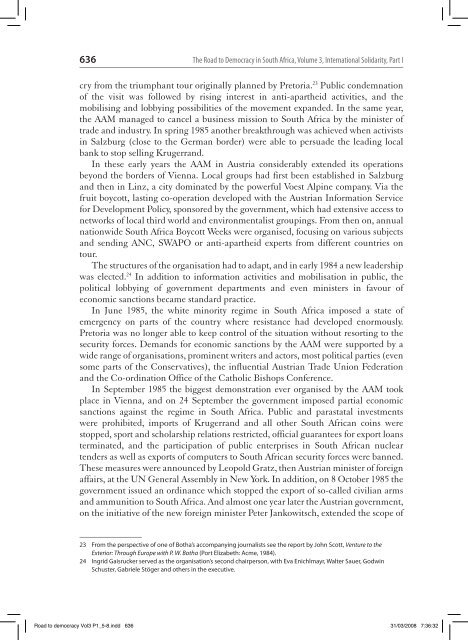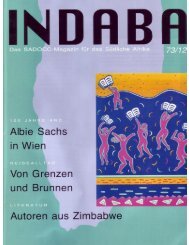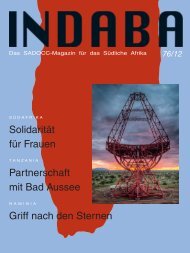Austria and South Africa during apartheid The set-up of ... - SADOCC
Austria and South Africa during apartheid The set-up of ... - SADOCC
Austria and South Africa during apartheid The set-up of ... - SADOCC
Create successful ePaper yourself
Turn your PDF publications into a flip-book with our unique Google optimized e-Paper software.
636 <strong>The</strong> Road to Democracy in <strong>South</strong> <strong>Africa</strong>, Volume 3, International Solidarity, Part I<br />
cry from the triumphant tour originally planned by Pretoria. 23 Public condemnation<br />
<strong>of</strong> the visit was followed by rising interest in anti-<strong>apartheid</strong> activities, <strong>and</strong> the<br />
mobilising <strong>and</strong> lobbying possibilities <strong>of</strong> the movement exp<strong>and</strong>ed. In the same year,<br />
the AAM managed to cancel a business mission to <strong>South</strong> <strong>Africa</strong> by the minister <strong>of</strong><br />
trade <strong>and</strong> industry. In spring 1985 another breakthrough was achieved when activists<br />
in Salzburg (close to the German border) were able to persuade the leading local<br />
bank to stop selling Krugerr<strong>and</strong>.<br />
In these early years the AAM in <strong>Austria</strong> considerably extended its operations<br />
beyond the borders <strong>of</strong> Vienna. Local gro<strong>up</strong>s had first been established in Salzburg<br />
<strong>and</strong> then in Linz, a city dominated by the powerful Voest Alpine company. Via the<br />
fruit boycott, lasting co-operation developed with the <strong>Austria</strong>n Information Service<br />
for Development Policy, sponsored by the government, which had extensive access to<br />
networks <strong>of</strong> local third world <strong>and</strong> environmentalist gro<strong>up</strong>ings. From then on, annual<br />
nationwide <strong>South</strong> <strong>Africa</strong> Boycott Weeks were organised, focusing on various subjects<br />
<strong>and</strong> sending ANC, SWAPO or anti-<strong>apartheid</strong> experts from different countries on<br />
tour.<br />
<strong>The</strong> structures <strong>of</strong> the organisation had to adapt, <strong>and</strong> in early 1984 a new leadership<br />
was elected. 24 In addition to information activities <strong>and</strong> mobilisation in public, the<br />
political lobbying <strong>of</strong> government departments <strong>and</strong> even ministers in favour <strong>of</strong><br />
economic sanctions became st<strong>and</strong>ard practice.<br />
In June 1985, the white minority regime in <strong>South</strong> <strong>Africa</strong> imposed a state <strong>of</strong><br />
emergency on parts <strong>of</strong> the country where resistance had developed enormously.<br />
Pretoria was no longer able to keep control <strong>of</strong> the situation without resorting to the<br />
security forces. Dem<strong>and</strong>s for economic sanctions by the AAM were s<strong>up</strong>ported by a<br />
wide range <strong>of</strong> organisations, prominent writers <strong>and</strong> actors, most political parties (even<br />
some parts <strong>of</strong> the Conservatives), the influential <strong>Austria</strong>n Trade Union Federation<br />
<strong>and</strong> the Co-ordination Office <strong>of</strong> the Catholic Bishops Conference.<br />
In September 1985 the biggest demonstration ever organised by the AAM took<br />
place in Vienna, <strong>and</strong> on 24 September the government imposed partial economic<br />
sanctions against the regime in <strong>South</strong> <strong>Africa</strong>. Public <strong>and</strong> parastatal investments<br />
were prohibited, imports <strong>of</strong> Krugerr<strong>and</strong> <strong>and</strong> all other <strong>South</strong> <strong>Africa</strong>n coins were<br />
stopped, sport <strong>and</strong> scholarship relations restricted, <strong>of</strong>ficial guarantees for export loans<br />
terminated, <strong>and</strong> the participation <strong>of</strong> public enterprises in <strong>South</strong> <strong>Africa</strong>n nuclear<br />
tenders as well as exports <strong>of</strong> computers to <strong>South</strong> <strong>Africa</strong>n security forces were banned.<br />
<strong>The</strong>se measures were announced by Leopold Gratz, then <strong>Austria</strong>n minister <strong>of</strong> foreign<br />
affairs, at the UN General Assembly in New York. In addition, on 8 October 1985 the<br />
government issued an ordinance which stopped the export <strong>of</strong> so-called civilian arms<br />
<strong>and</strong> ammunition to <strong>South</strong> <strong>Africa</strong>. And almost one year later the <strong>Austria</strong>n government,<br />
on the initiative <strong>of</strong> the new foreign minister Peter Jankowitsch, extended the scope <strong>of</strong><br />
23 From the perspective <strong>of</strong> one <strong>of</strong> Botha’s accompanying journalists see the report by John Scott, Venture to the<br />
Exterior: Through Europe with P. W. Botha (Port Elizabeth: Acme, 1984).<br />
24 Ingrid Gaisrucker served as the organisation’s second chairperson, with Eva Enichlmayr, Walter Sauer, Godwin<br />
Schuster, Gabriele Stöger <strong>and</strong> others in the executive.<br />
Road to democracy Vol3 P1_5-8.indd 636 31/03/2008 7:36:32





